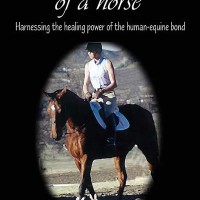
When thinking about addictions, some things are quite obvious, while others are much more disguised. Clearly, those with substance abuse issues of any kind are still subject to a healthy dose of social stigma. Often this desire to hide what is not considered acceptable by the masses is what fuels the emergence of a multitude of “exclusive” addiction centers. For a sense of what these day spa like treatment centers look like, just Google “Malibu drug treatment.” Yet this avoidance of the problem also disguises a much larger issue. That is, that aside from the war in the Middle East, addiction issues — from prevention efforts to treatment, loss of work time, health claims, and addiction related incarcerations — claim the largest share of national spending. So it seems fitting then that treatment centers scramble for the latest and greatest way to treat this massive social problem. Of late, equine therapy has become one of these nascent methods for getting to the root of what causes a person to turn to the bottle, pill, or powder.
Horses and addictions would seem strange bedfellows, but our four legged friends are actually quite well suited for this population. For one thing, addictions involve a great deal of denial. Denial not just of the problem, but of what one is actually feeling, thinking and doing. And this denial pervades beyond others, but to the self as well, leaving a person that has a very fractured understanding of himself. This detachment from the self can actually be a very prominent reason to drink.
In addition to denial, those with addictions have a very limited tolerance of emotions. What may be the normal, run of the mill emotional response for as sober person, can often seem overwhelming for a person with a history of addiction. And as time goes on, avoiding emotions and using a substance to distract one from them leads to a dwindling emotional tolerance, so much so, that very small hindrances can eventually precipitate a relapse.
While denial and limited emotional tolerance are considerable psychological hurdles, they are not as challenging as the addict’s reticence to treatment. Often, these clients may distrust the therapy process, as well as help, guidance and assistance even from friends and family. This may be the best support for the incorporation of horses into the therapeutic process.
Horses do not ask the questions that therapists may ask, and do not carry the same judgement, perceptions, and expectations of those the addict may fear. But aside from the disarming tendency any animal can have on people, horses are highly attuned to the physiological presentation of people — that is what is happening under the surface. Because this is the communication system on which horses rely, attending to what is unconscious for the addict, is actually a way for the horse to ensure his own safety. For in order to feel safe, the horse must be able to experience the environment in a way that he is familiar. So he attempts to create a “herd” out of himself and the person he is with, and in doing so, reads the person on a “felt” level — that is his physiological remnants of hidden fears, anger, grief, any worry. This response of the horse to the addict then helps to reveal what is most likely hidden to himself, as well as those around him (often the therapist as well). And because the horse is nonverbal, and inherently disarming, the natural denial tendencies of the addict are ameliorated.
Yet perhaps more than anything, horses carry an almost mythical ability to transfer their power, grace and beauty to those around them, and this is something that is inherently healing to anyone — especially an addict.